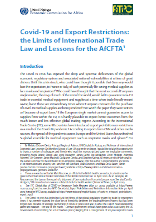Covid-19 and Export Restrictions: the Limits of International Trade Law and Lessons for the AfCFTA

The Covid-19 crisis has exposed the deep and systemic deficiencies of the global economic regulatory system and associated national vulnerabilities at a time of great distress. Until this crisis struck, who could have thought it possible that Germany would ban the exportation, to France or Italy, of such potentially life-saving medical supplies as face masks and respirators?2 Who could have thought that the most successful European single market, the envy of much of the rest of the world, would fail to guarantee intra-EU trade in essential medical equipment and supplies at a time when trade literally meant saving lives? These are extraordinary times where European contracts for the purchase of Covid-19 medical supplies are being rendered “not worth the paper they were written on” because of export bans.3 If the European single market cannot guarantee access to supplies from within the EU, it is hardly plausible to expect better outcomes from the much looser and less effective global trading regime. According to the International Trade Centre (ITC), some 90 countries have introduced export prohibitions or restrictions as a result of the Covid-19 pandemic.4 According to reports from CNN and other media sources, the spread of the pandemic across Europe and the United States has unleashed “a global scramble for medical equipment such as respirator masks and gloves.”5 For countries without domestic technological and manufacturing base, the effect is likely to be devastating.
In this short article, I aim to conduct a brief legal analysis to demonstrate the inadequacy of the global trading system to guarantee access to vital medical supplies during a global emergency to save lives and the absence of a legal or policy fix for it at that level.
It is a realisation that, in times of real emergency, law is never a substitute for humanity and solidarity; self-reliance and self-sufficiency – every country for itself – are reclaiming their traditional places. For Africa, perhaps the most important lesson to learn from the current situation is something that has been known for a long time but whose significance has been elevated to a different level – the imperative for Africa to build its scientific and industrial base.